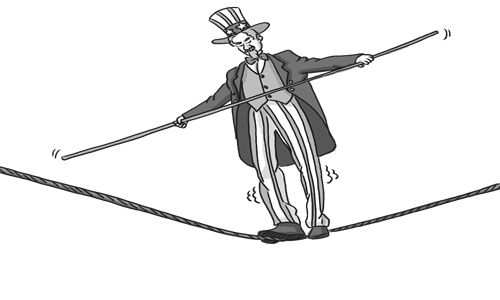HOME >> SOURCE
High-tech decoupling is riskier for US
By Chen Wenling Source:Global Times Published: 2019/12/24 19:11:56

Illustration: Xia Qing/GT
China and the US have agreed on the terms of a phase one trade deal, taking a step forward that has been long anticipated by the world. To maintain the good momentum, it's imperative for the two countries to be wary of the potential hazards of "decoupling in the high-tech sector." As the two largest innovation sources in the world, China and the US must try every means to avoid confrontation or isolation in this field.Decoupling in the high-tech sector could be more dangerous than the trade war. Today, innovation has become a strong engine for more and more economies. Innovation generates new technologies and business models that boost new growth. But it also means transformation and sharing. But, sadly, many US politicians don't get the point, narrow-mindedly believing that the US should maintain an exclusive technology advantage, the very mindset that jeopardizes global innovation development.
The rivalry and confrontation mindset is especially harmful amid the rapid development of a series of emerging technologies including AI, blockchain and quantum computing. Any technological achievements that can't turn into a link in the industry chain will be quickly replaced. Any technical machinery parts that can't be sold out will become waste, locked in warehouses.
China and the US are the largest economies and innovation sources in the world. Their total research inputs account for 46.4 percent of the world's. They also dominate the development of emerging technologies like blockchain and cloud computing. If the two major players turn against each other in innovation, the devastating consequences will be beyond imagination.
When the US put Huawei and other Chinese companies onto the "entity list," it was a temporary blow for them, but, in turn, the bans will also bite into US companies' profits or even survival. Permanent damage may be caused to some US companies when they lose access to the Chinese market or are left out of the global industrial chain.
Putting Huawei on the list also means US companies like Qualcomm can't engage in technology exchange with the 5G leading player that claims many international standards. The repeated postponement by the US government in implementing the ban due to complaints from US companies clearly shows that US companies can't afford to lose access to the Chinese market and cooperation with Chinese companies.
From the perspective of the global innovation chain, China and the US each have their own advantages and are highly complementary. The US has advantages in original innovation, cutting-edge innovation, and core components, but the largest application market and more business model innovation, format innovation, and scene innovation are in China. The US focuses on basic research and China focuses on applied research. The two should jointly promote the formation of a complete innovation industry chain. Meanwhile, various links in the industrial chain are interdependent, and if any link is interrupted, the entire industry may be paralyzed.
Innovation goes beyond borders. The more widely a technology is applied, the more value will it create. Innovation cooperation is crucial for all economies, and any country that wants to interrupt the shaping of global technology and industry chains will be hoisted by its own petard.
China has always stood for cooperation in the technology field. In the interim trade deal with the US, China has agreed to strengthen intellectual property protection and expand market access, showing great good will. The US should maintain the positive momentum from this hard-earned progress, and take this opportunity to get out of its arrogant mindset. The US must equally respect China's right to develop science and technology and give credit to Chinese leading tech companies, rather than using national power to suppress them.
The author is the chief economist at the China Center for International Economic Exchanges. bizopinion@globaltimes.com.cn
Posted in: EXPERT ASSESSMENT